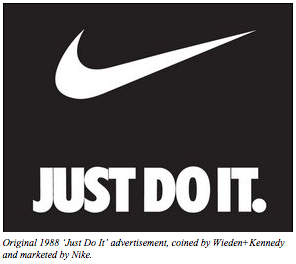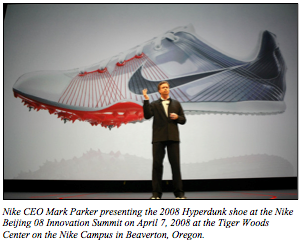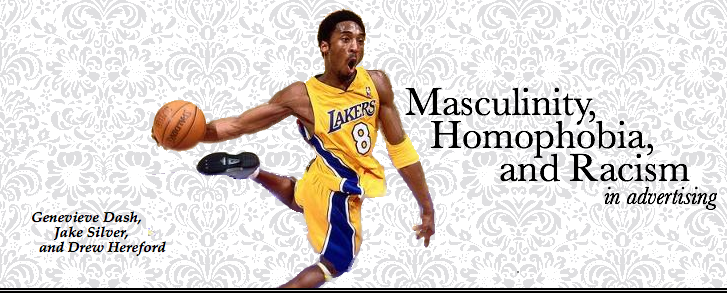
|
The advertisements
Nike has been known to be a 'gay-friendly' company through its support of gay civil unions2 and equality in hiring3, as exemplified by the Human Rights Campaign’s president in 2005, Joe Solmonese, stating, 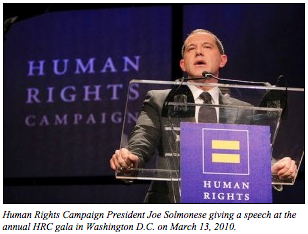 “Nike
knows
equality is not just the right thing to do,
it’s sound business
practice.”4
Salmonese’s quote conflates
capitalistic business methods
with the ‘equality’
involved in public advocacy for
or condemnation of homosexuality. These two cultural ideals intersect
within the advertisements involved in Nike’s 2008 Hyperdunk
campaign. As Sut Jhally notes, the elements of advertisements are not
“conducive to thinking. They induce feeling” (1995:
84). If our emotions are being sold to us in a symbolic interchange,
then Nike’s ads at hand present homoerotic
images of black
men to the public and that public can then either relate to or oppose
the individuals and emotions within the ads. Since Nike’s
historical advertisements generally feature young,
muscularized black men, as our advertisements at hand demonstrate, then
those more apt to connect to Nike’s ads on an emotional level
and place themselves within such ads are similarly racialized, young
black men. “Nike
knows
equality is not just the right thing to do,
it’s sound business
practice.”4
Salmonese’s quote conflates
capitalistic business methods
with the ‘equality’
involved in public advocacy for
or condemnation of homosexuality. These two cultural ideals intersect
within the advertisements involved in Nike’s 2008 Hyperdunk
campaign. As Sut Jhally notes, the elements of advertisements are not
“conducive to thinking. They induce feeling” (1995:
84). If our emotions are being sold to us in a symbolic interchange,
then Nike’s ads at hand present homoerotic
images of black
men to the public and that public can then either relate to or oppose
the individuals and emotions within the ads. Since Nike’s
historical advertisements generally feature young,
muscularized black men, as our advertisements at hand demonstrate, then
those more apt to connect to Nike’s ads on an emotional level
and place themselves within such ads are similarly racialized, young
black men.The power regimes of sexuality, race, and gender all arise within Nike’s Hyperdunk ads, which reflects a culturally charged time of race and sexuality relations. When these ads were first posted in March of 2008, Barack Obama was leading the race for the presidential ticket on the Democratic party, thus becoming a collective index of African American politics. The debate over sexual equality was also extremely saturated with controversy in 2008 with the national discourse over Proposition 8, which attempted to ban gay marriage in California and eventually was passed in November. This discourse over equality actualized a cultural spectacularization of homophobic agenda by amassing signatures for Prop 8 (which was gaining force and eventually received enough signatures on June 2, 2008 to quality for the ballot on November 4) and an equally powerful response of homosexual support. Looking from a racial aspect, the 58% majority of African American voters opposed gay marriage.5 Both Nike and Wieden+Kennedy reflected the culturally charged debates of 2008 within their own public discourses. Nike’s president filed a formal apology for their 2008 Hyperdunk campaign on July 23,
“They
[the
ads]
look
great but why keep hitting that same ignorant drum that its not "right"
to have your face next to some dude's junk. There are plenty of dudes
that have to deal with this bigoted idea in a real way every day. Love
the others though.”
The two following comments moreover represent approval for the advertising campaign: “Great
ads.
They don't have anything to do with homophobia. Nobody wants to get
dunked on. Get over yourselves. Not every media ad is an attack on your
sexuality. Your hypersensitivity is embarrassing.”
“As
a gay male
and a black
male, I find that some of the commenters are jumping the
gun and crying wolf for an ad that I feel is in no way homophobic.
Growing up, what made dunking on someone embarrassing
was and is not a
man's genitals in your face but the fact that you were slammed
on…I can't help but to feel that these comments are coming
from people who don't play or enjoy basketball to get the point of
reference.”
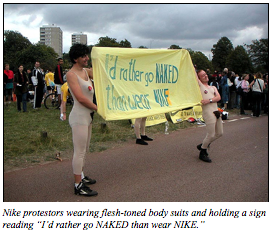 These two comments attempt to disintegrate the ontological possibility of homophobic influence in Wieden+Kennedy’s advertisements, and thus these messages' sentiments bring us back to our initial goal in analyzing them. It does not matter if the 2008 Hyperdunk ad campaign, or any other advertisements for that matter, straightforwardly represent homophobia or not. Perhaps, as many posters on the Wieden+Kennedy blog believed, these ads truly are rooted solely in sport, but it is the discursive power of the advertisements’ semiology that frames battle scenes at the intersection of sexual and cultural power regimes and potentially create violent and permanently polarizing cultural consequences. Such violent modalities of discourse are elaborated within the three specific ads of the Hyperdunk campaign that we chose to analyze: "That Ain't Right," "Say Hello," and "Punks Jump Up." Notes: 1. Dougherty, Philip H. (February 21, 1986). The Rising Regional Agencies. New York Times. 2. "Nike Letter in Support of Oregon Civil Union, Non-Discrimination Law, 2005," last modified June 25, 2005. <http://www.hrc.org//issues/marriage/civil_unions/7007.htm>. 3. "Nike Goes the Distance for Equality," last modified January 10, 2006. <http://www.hrc.org/1257.htm>. 4. "Nike’s Endorsement of Civil Unions Is Good Business Practice," last modified June 22, 2005. <http://www.hrc.org//issues/marriage/2221.htm>. 5. Patrick J. Egan and Kenneth Sherrill. "California Proposition 8: What Happened, and What Does the Future Hold?" National Gay and Lesbian Task Force. January 2009. 6. Hunsberger, Brent. "Nike responds to Hyperdunk ad critics." The Oregonian, July 23, 2008. 7. http://wkstudio.typepad.com/studio/2008/06/hyperdunk-print.html |
|||||||||
"Punks Jump Up" // Further Information // Sexism and Racism in Advertising Homepage
